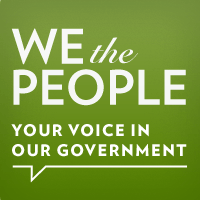White House Petitions: “We the People” gone wrong

The White House petition platform has been largely ineffective in raising legitimate issues and generates significantly more attention for outlandish requests, such as the creation of a Death Star.
In September 2011, the White House launched a platform called “We the People” (available at petitions.whitehouse.gov) that allows a US citizen to petition the government to take action on a specific issue the citizen deems important. At the time, only 5,000 digital signatures of support were required within a month to raise the petition to a level that would receive an official response/policy update from the administration. The platform was intended for the average citizen’s voice to be heard through a democratic process and to quickly raise popularly supported issues to the most senior levels. The administration has since increased the signature requirement to 25,000 and then 100,000 because of the antics of the online community.

With the exception of less than 5 petitions (that could have been brought to government attention through previously existing channels), the 280+ petitions that have reached the response threshold have not generated any real policy change or done anything beyond waste White House staffer time and provide comedic entertainment.
In late 2012, a petition called for the administration to immediately begin the construction of a DS-1 Orbital Battle Station, commonly known as the Death Star. It received more than 34,000 signatures, well above the 25,000 required at the time, and received both significant media attention and an official response from the administration.
The administration response cited the estimated $852 quadrillion production cost, lack of support for blowing up planets, and a fundamental design flaw that can be exploited by a one-man starship. The response drew even more mocking media attention, as well as the increased requirement to 100,000 signatures. Other less entertaining petitions have asked for a state’s right to secede after President Obama’s reelection and Obama’s impeachment.
Effectiveness and a Different Approach
When examining the effectiveness of the platform, it’s critical to think about the opportunity cost of White House staffers’ time spent crafting responses to the often outlandish petitions. If there are too many ridiculous petitions getting attention, then a typical response would be to raise the required signature threshold. However, as seen by comedian Stephen Colbert’s efforts to rename a NASA facility after himself by requesting his fans to vote for his name, there are still ways to break through higher support requirements in the name of comedy.
A different approach that could be more effective would involve funneling initial petitions into categories chosen as reasonable by the administration. Another method could involve the staffers creating petitions to judge interest/support for ideas. These ideas could be on a test-basis and not considered until reaching a similar threshold. The platform could also be used for polling public sentiment by asking limited response questions to the users.
Overall I believe the platform’s crowd-sourcing efforts for policy change are highly ineffective. A very small percentage of citizens have active accounts or have ever viewed the website. White House staff time is wasted viewing and responding to satirical petitions and very few issues of actual importance are brought to the administration’s attention through “We the People.”



This is so interesting and hilarious. Thank you for sharing! I like your idea of vetting ideas before they are actually put up for petition, though this could of course also create a lot of useless work for staffers who might have to sift through many death-star-like ideas. The White House could rely on the crowds to upvote useful ideas (similar to the way Reddit relies on readers to curate the best content to the top) but for that, they would have to have better direct network effects that actually drive diverse people to their platform (not just Star Wars and Colbert fans). What an interesting example of a failed use of crowds – I hope they figure out a way to make “We the People” function effectively.
Very cool post. One of my favorite examples of these petitions occurs annually in Texas. Every year, a contingent of dissatisfied citizens from around the state puts together a petition (always meeting the minimum number of signers) requesting that Texas secede from the United States. Citizens from Austin, a city known for being uncharacteristically liberal as compared to the rest of the state, routinely put together their own petition. Theirs requests that Austin remain a part of the country should Texas secede. Because of the laws, these petitions have to be considered by the White House. Amusing, but definitely not a great use of resources.
What a fascinating post. I had NO clue that this type of effort had even been made. Of course, at a high-level this sounds extremely enticing and offers a unique way to actually hear from the average citizen on issues that enough people care about. But, to your point, it wouldn’t have taken much upfront thought to realize how many different avenues would be available to abuse this system.
This reminds me a bit about how legislature is opened up to a period of “public comment”. During this period, anybody can comment on a piece of legislation, and all comments must be responded to. This has a huge time burden associated with it, BUT, it has remained in effect because it is has been deemed a valuable enough process to solicit input and generate buy-in. Or, perhaps, the practice is simply to engrained to actually change at this point…
Wow! This also reminds me a bit of alot of Twitter hashtags gone wrong, such as when NYPD created a hashtag #myNYPD, which was intended to draw support for positive stories and interactions with police, but instead was inundated with social concern and outrage about incidents of police brutality. I’ve seen this go wrong horrible for brands as well, but I think there is something to be said about how citizens view the government/institutions leveraging social media for community engagement. I think there is potential for tremendous value in crowd-sourcing ideas/comments from citizens, and I like your point about maybe having some broader categories of ideas–but Carina is right–who is going to filter all these ideas to separate wheat from the chaff? I think it could be expensive if executed properly, but don’t think it can be executed properly and efficiently without sufficient funds and resources.
I think this is a great example of engaging with crowds, though I have a different conclusion in that is has been somewhat successful in terms of of civic engagement. Yes, Colbert and Reddit can game the system, and they have. But I don’t think this is particularly costly for the govn’t. The media attention has raised awareness of We The People overall and people have been able to submit sincere petitions that resulted in a legitimate response from the administration. While it may not result in legislative changes, the constituents who submitted the petition are more engaged and feel heard. And writing a cheeky response (as the White House did with the Death Star proposoal) got plenty of positive media coverage — it earned the Office of Science and Technology Policy some nerdy street cred and demonstrated that they can take a joke and aren’t taking themselves too seriously. Thanks for the provocative post!
The government started this initiative to placate the masses, convincing us that we actually have a say when in reality, we don’t. It’s like bread and circus during ancient Rome. Entertainment for us so we don’t make a fuss about what’s really going on (massive corruption and massive spending).
The response of citizens is even more interesting. The fact that the Death Star petition was signed by so many people suggests that they don’t really take the government seriously. It’s a sign of the times – trust in government has plummeted, and most of us think it’s a joke given what’s really going on behind closed doors is not subject to a democratic process, and we only know half-truths from what we are fed via the media.
I know this is cynical but it’s very strange the government would spend time and resources on this.